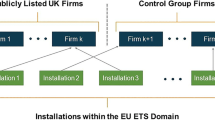Abstract
This study examined the impact of the financial crisis on the environmental and technical efficiencies of the Japanese manufacturing industry. Overall, we found that while the crisis had a negative impact on technical efficiency, it did not affect environmental efficiency—the only exception was the transportation equipment sector which improved its environmental efficiency following the crisis. Additionally, we found that capital intensity does not necessarily affect environmental efficiency. We discuss the implications of these findings and provide directions for future research.
Similar content being viewed by others
Notes
Dumontaux and Pop (2013), p. 269 indicated that “according to the bankruptcy petition #08-13555, filed on Monday, September 15th, 2008, Lehman's total assets of $639 billion made it the largest failure in US history, about six times bigger than the largest previous failure.”
According to Price et al. (2011), p. 2172, in 2007, “China’s State Council announced a Comprehensive Working Plan for Energy Conservation and Emission Reduction to accelerate the closing of small plants and those with outdated capacity in 14 high energy-consumption industries: electric power, iron-making, steel-making, electrolytic aluminum, ferroalloy, calcium carbide, coking, cement, coal, plate glass, pulp and paper, alcohol, monosodium glutamate, and citric acid. The policy estimates that the closures will save 118 Mtce (3.46 EJ).”
Note that one cannot use normal regression here as the measures of TE and EE estimated in 1st stage are censored between zero and one.
Because the collapse of Lehman Brothers occurred in September 2008, the financial crisis affected both 2008 and 2009 (Coulibaly et al. 2013). To check the robustness of our estimation, we apply another financial crisis dummy (called Crisis’) defined by Crisis’ = 1 if year = 2009 and Crisis’ = 0 if year is not 2009. Overall, we found high consistency in the results. More details can be obtained from the authors upon request.
This is obtained from the Mandatory Greenhouse Gas Accounting and Reporting System of the Ministry of the Environment.
Deflators for the Japanese firms come from the Statistics Bureau and the Bank of Japan database.
Detailed information about JSIC is described in the HP of Ministry of Internal Affairs and Communications. (http://www.soumu.go.jp/english/dgpp_ss/seido/sangyo/index.htm).
Price index is available on the following home page. http://www.imf.org/external/np/res/commod/Table1a.pdf.
References
Bekhet HA, Yasmin T (2014) Assessment of the global financial crisis effects on energy consumption and economic growth in Malaysia: an input–output analysis. Int Econ 140:49–70
Coulibaly B, Sapriza H, Zlate A (2013) Financial frictions, trade credit, and the 2008–09 global financial crisis. Int Rev Econ Finance 26:25–38
Dumontaux N, Pop A (2013) Understanding the market reaction to shockwaves: evidence from the failure of Lehman Brothers. J Financial Stability 9(3):269–286
Fernandez C, Koop G, Steel MF (2002) Multiple-output production with undesirable outputs. J Am Stat Assoc 97(458)
Fujii H, Managi S (2015) Optimal Production Resource Reallocation for CO2 Emissions Reduction in Manufacturing Sectors. Glob Environ Change. doi:10.1016/j.gloenvcha.2015.06.005
Fujii H, Kaneko S, Managi S (2010) Changes in environmentally sensitive productivity and technological modernization in China’s iron and steel industry in the 1990s. Environment and Development Economics 15(4):485–504
Fujii H, Managi S, Kawahara H (2011) The Pollution Release and Transfer Register system in the U.S. and Japan: an analysis of productivity. J Clean Prod 19(12):1330–1338
Fujii H, Iwata K, Kaneko S, Managi S (2013) Corporate environmental and economic performances of Japanese manufacturing firms: empirical study for sustainable development. Bus Strategy Environ 22(3):187–201
Fujii H, Cao J, Managi S (2015) Decomposition of productivity considering multi-environmental pollutants in Chinese industrial sector. Rev Dev Econ 19 (1):75–84
Kuramochi T (2015) Review of energy and climate policy developments in Japan before and after Fukushima. Renew Sustain Energy Rev 43:1320–1332
Managi S, Kaneko S (2006) Productivity of Market and Environmental Abatement in China. Environ Econ Policy Studies 7(4):459–470
Morita H (2014) External shocks and Japanese business cycles: evidence from a sign-restricted VAR model. Jpn World Econ 30:59–74
Nguyen H, Qian R (2014) Demand collapse or credit crunch to firms? Evidence from the World Bank’s financial crisis survey in Eastern Europe. J Int Money Finance 47:125–144
Pratap S, Urrutia S (2012) Financial frictions and total factor productivity: accounting for the real effects of financial crises. Rev Econ Dynamics 15(3):336–358
Price L, Levine MD, Zhou N, Fridley D, Aden N, Lu H, McNeil M, Zheng N, Qin Y, Yowargana P (2011) Assessment of China’s energy-saving and emission-reduction accomplishments and opportunities during the 11th Five Year Plan. Energy Policy 39(4):2165–2178
Toyota Motor Corporation (2013) Respect for the planet-toyota’s environmental initiatives. http://www.toyota-global.com/sustainability/report/archive/er13/. Accessed 24 Feb 2015
Yagi M, Fujii H, Hoang V, Managi S (2015) Environmental efficiency of energy, materials, and emissions. J Environ Manage 161:206–218
Acknowledgments
This paper was supported by Grant-in-Aid for Specially Promoted Research (26000001) by Japan Society for the Promotion of Science.
Author information
Authors and Affiliations
Corresponding author
About this article
Cite this article
Fujii, H., Assaf, A.G., Managi, S. et al. Did the financial crisis affect environmental efficiency? evidence from the Japanese manufacturing sector. Environ Econ Policy Stud 18, 159–168 (2016). https://doi.org/10.1007/s10018-015-0127-0
Received:
Accepted:
Published:
Issue Date:
DOI: https://doi.org/10.1007/s10018-015-0127-0




